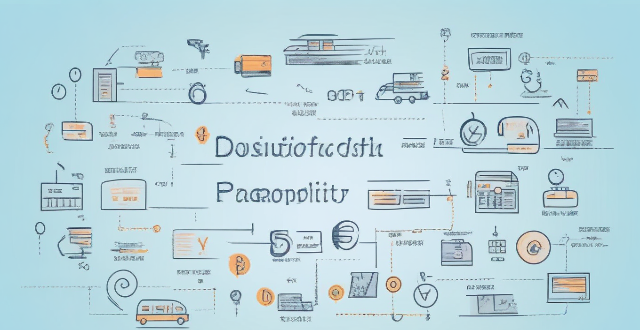Social Reputation

How do celebrities manage their online presence and reputation on social media ?
Celebrities manage their online presence and reputation on social media by hiring a social media manager, maintaining consistency across platforms, engaging with fans, promoting positive messages, handling criticism gracefully, and monitoring their image. These strategies help them maintain a positive online presence while connecting with fans and promoting their work effectively.

How do climate-related CSR efforts affect a company's reputation and consumer perception ?
The text discusses the impact of climate-related corporate social responsibility (CSR) efforts on company reputation and consumer perception. It emphasizes that CSR has become essential for modern businesses, especially in terms of environmental responsibility. The importance of reputation and perception is highlighted, with brand image, investor confidence, stakeholder engagement, consumer loyalty, market differentiation, and risk mitigation being key factors. The article then explores the positive effects of climate-related CSR efforts on reputation and perception. These include public recognition, industry leadership, alignment with values, a trustworthy brand image, social responsibility, and innovative approaches. However, potential challenges such as greenwashing accusations, unmet expectations, negative scrutiny, skepticism, cost pass-through concerns, and inconsistency issues can also arise. In conclusion, the article stresses the significance of climate-related CSR efforts in shaping a company's reputation and consumer perception. To maximize benefits and minimize risks, companies must ensure their climate-related CSR strategies are genuine, transparent, and consistent with their overall business operations.

Can celebrity endorsements negatively affect a brand's reputation ?
Celebrity endorsements can negatively affect a brand's reputation due to lack of trustworthiness, misalignment with brand values, controversies and scandals, and overexposure. Brands must carefully consider these factors when selecting celebrities to endorse their products or services to minimize the risks associated with celebrity endorsements and maintain a positive reputation.

How do negative product reviews affect a company's reputation ?
Negative product reviews can have a significant impact on a company's reputation, affecting everything from sales and profits to employee morale and customer loyalty. Here are some ways in which they can affect it: 1. Loss of Trust: Negative reviews can erode the trust that customers have in a company, making them less likely to do business with them in the future. It can also make potential new customers hesitant to try the company's products or services. 2. Decreased Sales: Negative reviews can lead to decreased sales as customers may be discouraged from purchasing the product. This can result in lost revenue for the company, which can ultimately harm its financial stability. 3. Damage to Brand Image: Negative reviews can damage a company's brand image, making it harder for them to attract new customers or retain existing ones. It can also make it more difficult for the company to launch new products or expand into new markets. 4. Loss of Market Share: If a company's reputation is damaged by negative reviews, it can lose market share to competitors who have better reviews and reputation. This can lead to a decline in profits and potentially even bankruptcy if the company is unable to recover. 5. Difficulty Hiring Talent: Negative reviews can make it harder for companies to attract top talent, as potential employees may be wary of working for a company with a poor reputation. This can limit the company's ability to grow and innovate, further damaging its reputation and financial stability. In conclusion, it is essential for companies to take steps to address negative reviews and work to improve their overall reputation to avoid these consequences.

What role does a celebrity's reputation play in the success of their business ventures ?
The reputation of a celebrity can significantly impact the success of their business ventures. A positive reputation can establish trust and credibility with consumers, align with brand image, provide effective marketing opportunities, and foster customer loyalty. Managing perception is crucial in maintaining a positive reputation and avoiding negative publicity that could harm the business's reputation. Overall, a celebrity's reputation is a valuable asset that can contribute to the success and longevity of their business endeavors.

How do issues like doping scandals affect the reputation of countries in international sports ?
Doping scandals have a negative impact on the reputation of countries in international sports, including loss of credibility, negative media coverage, reduced participation in international competitions, financial consequences, and damage to athlete reputations.

In what ways can social media impact my personal image ?
Social media has become an integral part of our daily lives, and it can significantly impact our personal image. Here are some ways in which social media can affect how others perceive us: Positive Effects: - Building a Professional Brand: Social media provides networking opportunities and allows individuals to showcase their achievements and expertise. - Enhancing Personal Reputation: Individuals can project a positive image by sharing accomplishments, hobbies, and interests, and engage with followers to build a loyal community. Negative Effects: - Damaging Professional Reputation: Posting unprofessional content or oversharing personal information can harm one's professional image and lead to privacy breaches. - Harming Personal Reputation: Cyberbullying and sharing false information can damage mental health and make individuals appear unreliable or irresponsible. Managing Your Online Presence: - Best Practices for Maintaining a Positive Image: Monitor your content, use privacy settings, think before you post, and maintain consistency across platforms. - Handling Negative Situations: Address mistakes proactively and seek professional help if necessary. Overall, social media can be a powerful tool for enhancing or damaging one's personal image. By being mindful of what you share online and actively managing your digital footprint, you can use social media to your advantage while minimizing potential risks.

What are some examples of successful corporate social responsibility programs ?
Successful Corporate Social Responsibility (CSR) programs benefit society and the environment, enhancing a company's reputation. Examples include Starbucks supporting coffee farmers, Coca-Cola providing clean water in Africa, Unilever reducing carbon emissions, Microsoft using AI for environmental solutions, Walmart reducing food waste, Google powering operations with renewable energy, Patagonia donating to environmental causes, and Johnson & Johnson raising funds through social media engagement. These programs not only make a positive impact but also strengthen relationships with stakeholders.

Why is corporate social responsibility important for businesses ?
In full: Why Corporate Social Responsibility is Important for Businesses Corporate social responsibility (CSR) is crucial for businesses as it helps manage reputation, mitigate risks, foster innovation and competitive advantage, and attract and retain top talent. Companies that engage in socially responsible practices are seen as trustworthy, ethical, and caring by consumers, investors, and employees. This positive image can lead to increased customer loyalty, higher employee retention rates, and better access to capital. By adopting sustainable practices, companies can reduce their exposure to regulatory fines, lawsuits, and reputational damage resulting from environmental or social misconduct. CSR also encourages innovation and competitive advantage by promoting creativity and collaboration within organizations. Today's job seekers are increasingly looking for employers who share their values and demonstrate a commitment to making a positive impact on society and the environment. By embracing CSR, companies can attract and retain employees who are passionate about making a difference in the world. As consumers become more aware of the impact of business on society and the environment, companies that prioritize CSR will be well-positioned to succeed in the long run.

How does corporate social responsibility impact employee satisfaction and retention ?
Corporate Social Responsibility (CSR) is a business model that focuses on balancing profitability with social responsibility. It involves companies taking actions to improve societal well-being, environmental sustainability, and ethical practices. This approach not only benefits the community and the environment but also has a significant impact on employee satisfaction and retention. The relationship between CSR and employee satisfaction includes enhanced company image and reputation, alignment with personal values, and improved work environment. The relationship between CSR and employee retention includes lower turnover rates, increased loyalty, and higher engagement levels. In conclusion, corporate social responsibility plays a crucial role in enhancing employee satisfaction and retention. By prioritizing CSR initiatives, companies can create a positive work environment, attract and retain talent, and foster loyalty among their employees. As a result, businesses that embrace CSR are more likely to have a stable workforce and achieve long-term success.

How does social media influence consumer behavior ?
Social media has transformed consumer behavior by increasing brand awareness, influencing purchasing habits, and changing perceptions of brands. It enables consumers to compare products, share feedback, and engage with companies directly. Social media also plays a crucial role in product development by providing insights into consumer needs and preferences. Companies can foster customer loyalty through engagement and exclusive deals on these platforms. The rise of social commerce allows for direct purchases within apps and live streaming sales events. Personalization and targeted marketing, including influencer collaborations, further impact consumer choices. Overall, social media's influence on consumer behavior is significant and continues to evolve with technological advancements.

What role does social media play in modern journalism ?
The Role of Social Media in Modern Journalism Social media has become an integral part of modern journalism, playing a significant role in the way news is gathered, distributed, and consumed. Here are some key ways social media influences journalism: 1. Breaking News and Real-Time Updates 2. Audience Interaction and Feedback 3. Investigative Journalism 4. Verification and Fact-Checking 5. Distribution and Content Promotion 6. Brand Building for Journalists 7. Monetization Opportunities 8. Ethical Considerations Overall, social media has reshaped journalism by providing new avenues for storytelling, audience engagement, and distribution. However, it also poses challenges related to accuracy, ethics, and the commercial aspects of news dissemination. Journalists must navigate these complexities to leverage social media effectively while maintaining the integrity of their craft.

What are the consequences of violating academic integrity principles ?
Violating academic integrity principles can lead to serious consequences on both individual and institutional levels, including academic penalties, damage to reputation, difficulty gaining acceptance into programs or securing employment, emotional distress, and potential loss of accreditation for institutions. It is essential for students to understand the importance of maintaining academic integrity to protect their personal and professional futures, as well as the reputation of their educational institutions.

What is the role of social media in sports marketing ?
The article explores the role of social media in sports marketing, highlighting its ability to engage with fans, promote events, and build brand awareness. It suggests that by producing high-quality content and engaging with followers, sports organizations can increase their online presence and attract new fans. The article also discusses strategies for promoting events on social media, such as targeted advertising and word-of-mouth marketing. Overall, it emphasizes the importance of social media in modern sports marketing and encourages teams to leverage these platforms to reach their target audience.

What are the benefits and drawbacks of social media marketing for small businesses ?
Social media marketing offers small businesses increased brand awareness, cost-effective marketing, targeted advertising, customer engagement, and a competitive edge. However, it also presents challenges such as being time-consuming, facing negative feedback, difficulty in measuring ROI, dependency on algorithm changes, and cybersecurity risks. Small businesses should consider these factors when deciding whether to incorporate social media marketing into their overall strategy.

What role does social media play in shaping a celebrity's image and brand ?
The text discusses the role of social media in shaping a celebrity's image and brand. It outlines six key ways in which social media impacts a celebrity's public perception and personal branding: connecting with fans, controlling the narrative, promoting projects, endorsements and sponsorships, crisis management, and personal branding. The text emphasizes that social media is an integral part of modern society and plays a significant role in building a loyal fan base, generating buzz for projects, expanding reach and influence through endorsements, handling crises effectively, and developing a distinct personal brand.

What are the benefits of social inclusion for individuals and society as a whole ?
Social inclusion benefits individuals and society by promoting equality, diversity, and participation. Individuals experience enhanced quality of life, greater opportunities, improved mental health, increased self-esteem, and strengthened social support networks. Society benefits from economic growth, reduced poverty and inequality, improved public services, enhanced social cohesion, increased civic engagement, promotion of human rights, a positive global image, and intergenerational equity.

How do celebrities balance their personal and professional lives on social media ?
Balancing personal and professional lives on social media can be challenging for celebrities. Clear boundaries, separating personal and professional accounts, scheduling posts wisely, engaging with followers appropriately, and seeking professional help when needed are effective strategies for maintaining this balance. By following these strategies, celebrities can maintain a healthy balance between their personal and professional lives on social media while still connecting with their fans in meaningful ways.

What are the best practices for social media advertising ?
Best practices for social media advertising include defining goals, understanding the audience, choosing the right platform, creating compelling content, optimizing for mobile devices, testing and refining ads, monitoring budget, leveraging social proof, and staying up-to-date with platform changes. These strategies help achieve better results in terms of engagement, lead generation, and sales.

Can social media platforms be used to enhance social harmony ?
Can social media platforms be used to enhance social harmony? The text discusses the positive impact of social media on social harmony, including connectivity and communication, sharing information and ideas, and civic engagement and activism. However, it also highlights challenges and risks such as misinformation and fake news, online harassment and cyberbullying, and echo chambers and polarization. The conclusion states that social media platforms have the potential to enhance social harmony, but challenges must be addressed to ensure their positive impact.

What is corporate social responsibility (CSR) ?
Corporate social responsibility (CSR) is an approach where companies voluntarily integrate ethical and sustainable practices into their business model. It covers various aspects including environmental sustainability, ethical sourcing, community engagement, stakeholder relationships, and transparency. Implementing CSR can enhance a company's reputation, improve employee loyalty, and manage risks better. From a societal perspective, it can elevate living standards, promote sustainable development, and set ethical standards across industries. However, criticisms include potential greenwashing, increased costs for consumers, and a lack of universal standards for measuring CSR effectiveness. Despite these criticisms, the incorporation of CSR is becoming increasingly common, indicating a shift towards a more ethical and sustainable global economy.

What are the potential consequences of ignoring food safety standards ?
Ignoring food safety standards can lead to health risks, legal issues, and damage to a company's reputation. The most immediate consequence is potential harm to human health, including foodborne illnesses, allergic reactions, and chronic health problems. Legal issues may arise from fines and penalties, lawsuits, and loss of business licenses. Ignoring food safety standards can also damage a company's reputation through loss of customer trust, negative publicity, and decreased sales. It is essential for all stakeholders in the food industry to prioritize food safety practices to protect public health, comply with legal requirements, and maintain a positive reputation.

What are the social implications of environmental degradation ?
The article discusses the social implications of environmental degradation, including health impacts such as air pollution and water pollution, economic impacts such as loss of biodiversity and job losses, social impacts such as displacement and cultural loss, and political impacts such as conflicts and refugees. It emphasizes the need for collective action to address these challenges and protect the natural environment for future generations.

How does social harmony impact economic development and stability ?
Social harmony is essential for economic development and stability, as it increases productivity, reduces conflict, improves governance, attracts foreign investment, and enhances social cohesion.

Can corporate social responsibility lead to increased profits for businesses ?
The text discusses the potential for corporate social responsibility (CSR) to increase profits for businesses. It outlines key points such as enhanced brand reputation, improved employee morale and productivity, competitive advantage, risk mitigation, and access to capital as benefits of CSR. However, it also acknowledges potential challenges like short-term costs, difficulty in measuring ROI, and skepticism from consumers and stakeholders. The text provides examples of successful CSR programs that have led to increased profits, including Patagonia, Ben & Jerry's, and Tesla. It concludes that while the relationship between CSR and profitability is complex, a strong commitment to CSR can indeed lead to increased profits if approached authentically and strategically.

What are the social consequences of natural disasters caused by climate change ?
Natural disasters, intensified by climate change, have extensive social repercussions affecting health, economy, social order, education, and the environment. Immediate impacts include physical harm and mental distress, while long-term effects range from economic setbacks to environmental degradation. Addressing these consequences necessitates a multifaceted strategy encompassing emergency measures, recovery efforts, and sustainable development practices to foster community resilience.

What are the psychological effects of social media on teenagers ?
This article discusses the psychological effects of social media on teenagers, including increased anxiety and depression due to comparison with others' lives, fear of missing out (FOMO), cyberbullying, disrupted sleep patterns, decreased face-to-face interaction, body image issues, and cyberchondria. Parents and educators should monitor their children's social media usage and encourage healthy habits to help them navigate these challenges.

What are the consequences of ignoring workplace safety regulations ?
Ignoring workplace safety regulations can lead to legal, financial, and human consequences for both individuals and organizations. Legal consequences include fines and penalties, legal liability, and loss of certifications. Financial consequences involve increased insurance costs, productivity losses, and reputation damage. Human consequences encompass injuries and deaths, mental health impact, and low employee morale. Prioritizing safety is crucial for protecting employees, maintaining a good reputation, and ensuring long-term success.

Can you provide examples of female-driven social enterprises that combine business with philanthropy ?
Female-driven social enterprises are combining business with philanthropy to create positive change in society, empowering marginalized individuals and promoting sustainability. Examples include Samasource, Prodigy Finance, Kiva, S'well, and Girlfriend Collective. These organizations demonstrate the power of women in driving social impact through sustainable business practices.